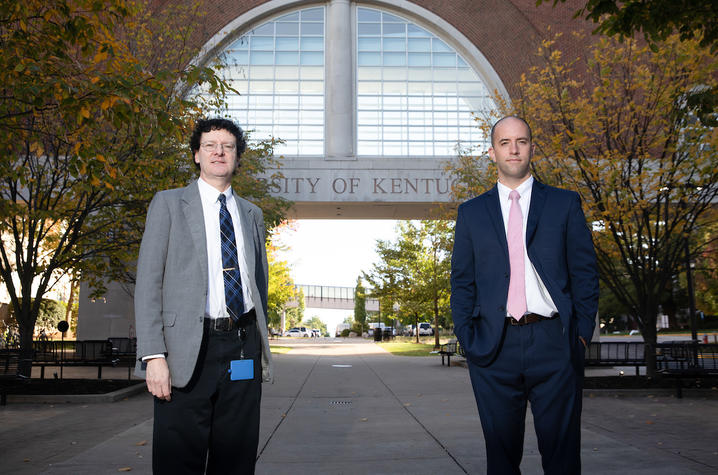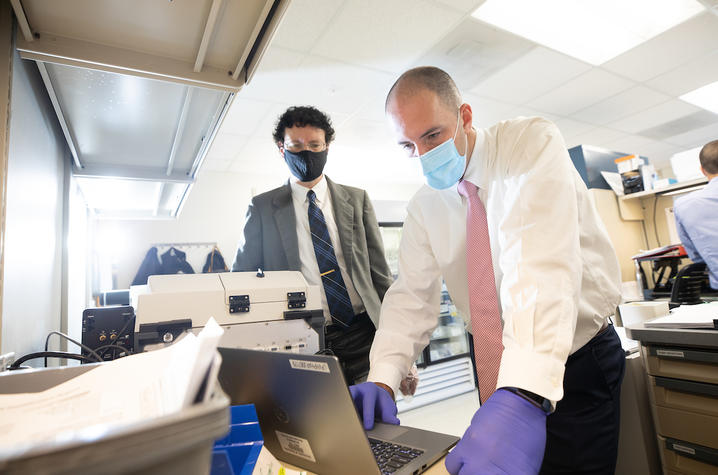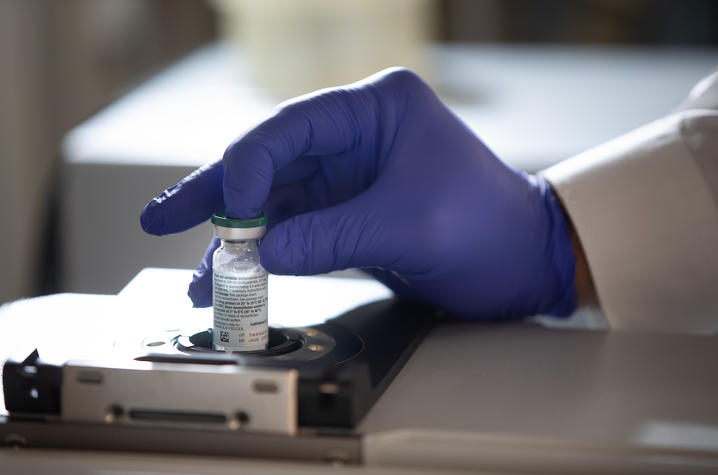UK Drug Quality Testing Leads to Petition to Recall Injectable Drug
LEXINGTON, Ky. (Oct. 1, 2020) — A drug quality study conducted at the University of Kentucky found impurities and lower than acceptable levels of the active pharmaceutical ingredient in some samples of a commonly used injectable drug. As a result, UK filed a petition Sept. 30 with the Food and Drug Administration (FDA) to recall identified lots of the medication.
Acetazolamide is an injectable diuretic available as a generic medication that is commonly used to treat glaucoma, epilepsy, altitude sickness and fluid retention.
Some samples of acetazolamide tested at UK HealthCare Pharmacy, which provides the health care system’s inpatient, ambulatory, retail and specialty pharmacy services, were found to have more than four times the FDA’s acceptable level of impurities.
The drug is among the first to be tested as part of UK’s Drug Quality Study (DQS), a quality control process developed in partnership between UK HealthCare and the UK College of Pharmacy, to test UK HealthCare’s incoming drugs for identity and quality in order to improve patient outcomes and to report adulterated drugs to the FDA.
The DQS was launched in 2019 by UK HealthCare’s Chief Pharmacist Philip Almeter, Pharm.D., and Pharmaceutical Sciences Professor Robert Lodder, Ph.D. To our knowledge, UK is one of only two pharmacies in the U.S. currently testing incoming stock of medications for quality, purity and potential contamination.
“The study is truly a testament to the innovation that comes out of UK HealthCare and our commitment to medication safety,” said Almeter. “Assessing the quality of drugs given to our patients is another way we are taking care of everybody who comes through our doors.”
In August 2020, samples of acetazolamide in stock at UK HealthCare were tested applying multiple testing techniques. The tests revealed several vials had significant variations in their contents, indicating concerns in the manufacturing process. As soon as concerns regarding the injectable form of acetazolamide were identified, the drug made by those manufacturers was removed from UK HealthCare pharmacies.
Results were then confirmed by AMRI, a global contract research and manufacturing organization and an independent third-party, which determined that the samples of Mylan’s product contained only 80 to 87% of the active pharmaceutical ingredient. This level is less than what is allowed by the United States Pharmacopeia (USP), which sets the standard that the FDA follows. The remaining impurities are of unknown substances. Almeter and Lodder say this could be due to the breakdown of the drug, or the result of reagents used to make it.
“We are not aware of any unexpected adverse effects in patients administered this FDA-approved drug, but the findings by our Drug Quality Safety team are concerning to us,” said Dr. Mark Newman, UK executive vice president for health affairs. “Patient safety is our utmost priority at UK HealthCare and being at the forefront of drug quality and safety is an effort we commend our team for undertaking to assist in top-quality care.
“It is very important that you do not stop taking medications prescribed to you,” Newman added. “If you have questions about your medications, please consult your pharmacist or medical provider.”
On Sept. 30, a petition was filed requesting that the FDA recall the lot of Acetazolamide #7604764 manufactured in India by Mylan Laboratories, as well as lot #2001028.1 manufactured by Hikma in Portugal, which also showed impurities in initial testing.
“Drug quality in the United States is ensured by maintaining control of the manufacturing process,” said Lodder. “The fact that the process is producing samples of varying composition indicates that process control is not being maintained.”
The petition also requests examinations and investigation of acetazolamide and its manufacturing process, and that the FDA provide information to the public regarding the product.
As the state’s flagship, land-grant institution, the University of Kentucky exists to advance the Commonwealth. We do that by preparing the next generation of leaders — placing students at the heart of everything we do — and transforming the lives of Kentuckians through education, research and creative work, service and health care. We pride ourselves on being a catalyst for breakthroughs and a force for healing, a place where ingenuity unfolds. It's all made possible by our people — visionaries, disruptors and pioneers — who make up 200 academic programs, a $476.5 million research and development enterprise and a world-class medical center, all on one campus.
In 2022, UK was ranked by Forbes as one of the “Best Employers for New Grads” and named a “Diversity Champion” by INSIGHT into Diversity, a testament to our commitment to advance Kentucky and create a community of belonging for everyone. While our mission looks different in many ways than it did in 1865, the vision of service to our Commonwealth and the world remains the same. We are the University for Kentucky.







